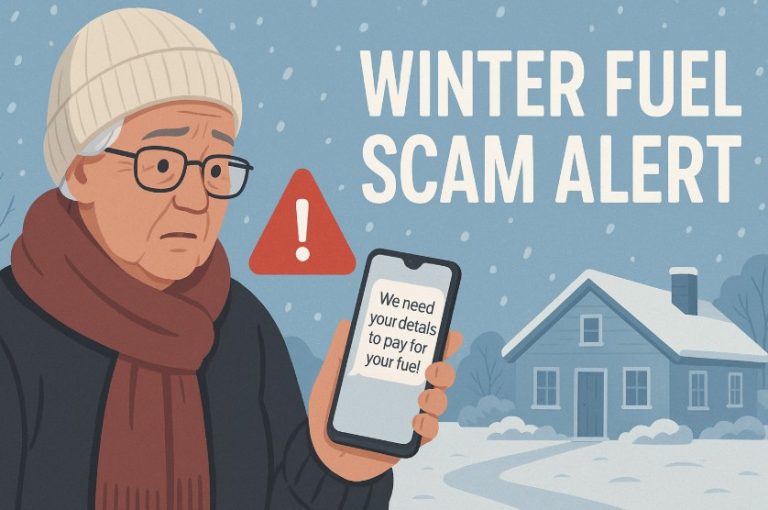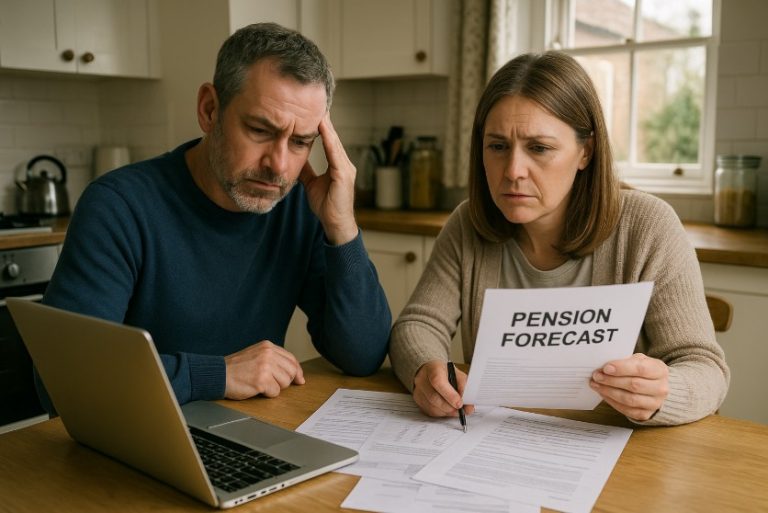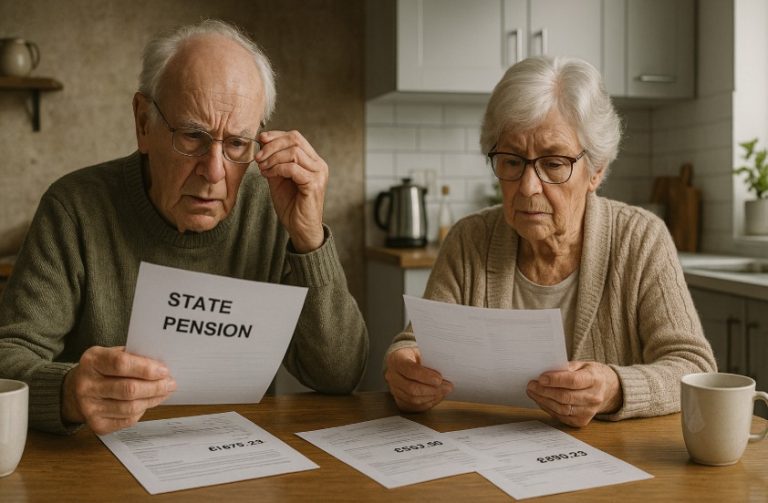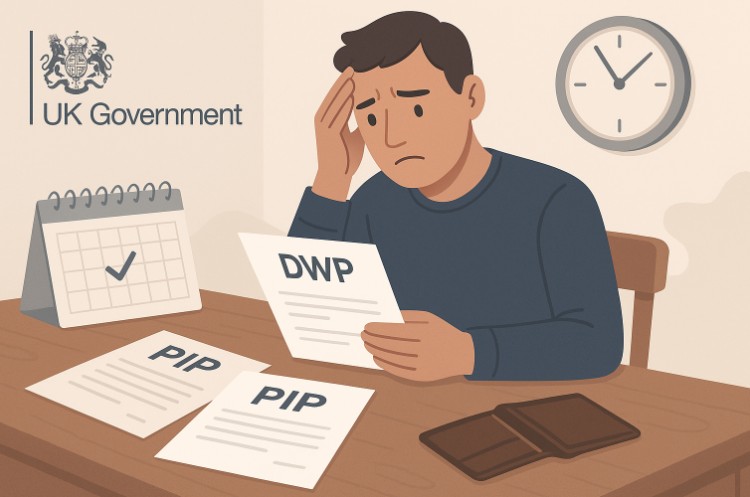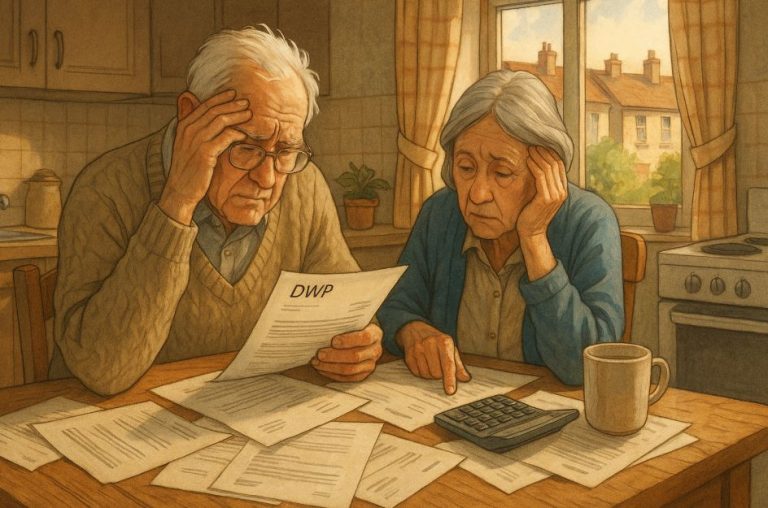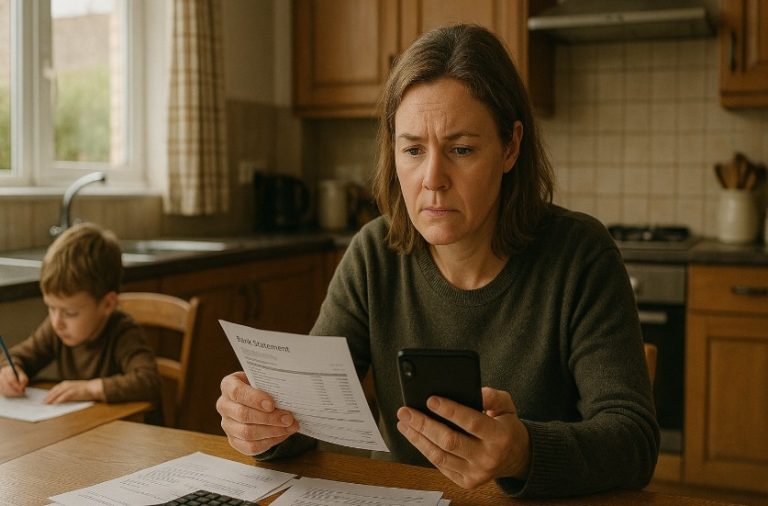Carer’s Allowance and Personal Independence Payment (PIP) are separate benefits in the UK, each with its own purpose and eligibility rules.
However, they are often linked through a carer–recipient relationship. If someone is providing care for a person who receives PIP, especially its daily living component, they may be entitled to Carer’s Allowance. But how does this impact both the carer and the person being cared for?
In this article, we explore how Carer’s Allowance interacts with PIP and other benefits, and what claimants need to consider before applying.
What is Carer’s Allowance and Who is Eligible to Claim It?

Carer’s Allowance is a taxable benefit for individuals who spend a substantial amount of time caring for someone with a disability. As of the 2025 rate, the weekly payment is £81.90.
To qualify, the claimant must:
- Be 16 years or older
- Spend at least 35 hours per week caring for someone
- Earn no more than £151 per week after tax, National Insurance, and certain expenses
- Not be in full-time education or subject to immigration control
The person being cared for must receive a qualifying disability benefit. This includes:
- Personal Independence Payment
- Disability Living Allowance (middle or highest care rate)
- Attendance Allowance
Carer’s Allowance is not means-tested, which means your savings do not affect eligibility. However, it may affect the amount of other benefits you or the person you care for receive.
How Does Carer’s Allowance Interact with Personal Independence Payment (PIP)?
Carer’s Allowance and Personal Independence Payment (PIP) are two separate benefits in the UK benefits system. They are designed for different purposes: Carer’s Allowance supports individuals who provide substantial unpaid care, while PIP supports individuals living with long-term health conditions or disabilities that affect their daily life or mobility.
However, even though they are distinct, there is an important relationship between the two, particularly when someone claims Carer’s Allowance based on the recipient’s PIP award.
Eligibility Link Between Carer’s Allowance and PIP
A person can only qualify for Carer’s Allowance if the person they are caring for receives a qualifying disability benefit. PIP qualifies, but only its daily living component not the mobility component.
This means that if the person being cared for receives PIP daily living at either the standard or enhanced rate, the carer may meet one of the conditions for Carer’s Allowance.
If the person being cared for receives only the mobility component, then their carer cannot claim Carer’s Allowance on that basis.
This creates a direct link:
- The PIP recipient’s award determines whether the carer can apply
- The carer’s circumstances (such as hours of care and income) determine whether the claim is successful
Does Receiving Carer’s Allowance Affect the PIP Award?
No, the Carer’s Allowance itself does not reduce or change the amount of PIP the person being cared for receives. The person receiving PIP will continue to receive both their daily living and mobility components, provided their condition remains the same and they continue to meet eligibility.
This is a common misunderstanding. Many assume that if someone claims Carer’s Allowance for helping a PIP recipient, the PIP might be reduced or stopped. That is not the case. The PIP recipient’s entitlement is not impacted by someone else receiving Carer’s Allowance.
However, there may be indirect consequences, depending on the overall benefit situation of the person receiving PIP.
Severe Disability Premium and Other Linked Benefits
Although PIP is not affected, other means-tested benefits that the PIP recipient receives can be impacted by a carer claiming Carer’s Allowance.
If the person receiving PIP is also receiving a Severe Disability Premium (SDP) or an extra amount for severe disability in Pension Credit, these payments may stop if someone begins claiming Carer’s Allowance for them.
That’s because one of the conditions for receiving SDP or similar additions is that no one must be claiming Carer’s Allowance for providing care to the person. Once a carer is officially recognised through Carer’s Allowance, the system assumes the person is receiving enough support and no longer qualifies for that extra disability-related premium.
Similarly, some Council Tax Reductions tied to severe disability might end if someone starts receiving Carer’s Allowance for providing care.
These impacts are important because they can reduce the total income of the PIP recipient, even though their PIP award remains unchanged.
When Does the Carer Need to Inform Authorities?
If someone begins claiming Carer’s Allowance for a PIP recipient, it is essential to notify the relevant authorities, such as:
- Jobcentre Plus
- The local council (for Housing Benefit or Council Tax support)
- The Pension Service
- The Universal Credit service centre (if applicable)
Likewise, the person receiving PIP should also inform these agencies, especially if they are getting Severe Disability Premium or Pension Credit.
Failing to report such a change could lead to overpayments, which the authorities will request to be repaid once identified.
Can You Get Both Carer’s Allowance and Universal Credit?
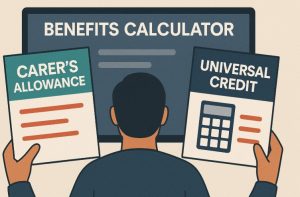
Carers can claim Universal Credit alongside Carer’s Allowance, but there are conditions.
When someone receives Carer’s Allowance, that amount is deducted from their Universal Credit payment. However, they may also receive a Carer Element in their Universal Credit, which increases the total amount payable.
As of 2025, the Carer Element in Universal Credit is £198.31 per month. This is in addition to any standard Universal Credit entitlement.
Here is how the interaction typically works:
| Component | Amount (2025) | How It’s Treated in Universal Credit |
| Carer’s Allowance | £81.90/week | Fully deducted from UC |
| Carer Element in Universal Credit | £198.31/month | Added to UC entitlement |
To ensure proper calculations, it’s vital that claimants:
- Declare their caring responsibilities in their UC account
- Update any changes to caring hours or income
- Use a benefits calculator to forecast how their payments may be affected
How Does Carer’s Allowance Affect Means-Tested Benefits?
Means-tested benefits are calculated based on income and other financial resources. Since Carer’s Allowance is a taxable benefit, it is usually treated as income for these calculations. This can either reduce the amount of other benefits or trigger eligibility for additional support.
Examples of means-tested benefits that may be affected include:
- Housing Benefit
- Income Support
- Income-related Employment and Support Allowance (ESA)
- Council Tax Reduction
- Pension Credit
In many cases, claimants may qualify for a Carer Premium or Addition. This helps to offset the impact of receiving Carer’s Allowance.
The Carer Premium (or Addition) is currently:
- £42.75 per week (2025)
This is usually added to the calculation of means-tested benefits, potentially increasing the overall entitlement despite the Carer’s Allowance being treated as income.
What Happens When Carer’s Allowance Overlaps With Other Benefits?
Carer’s Allowance cannot be paid in full alongside certain other benefits due to the overlapping benefits rule. This commonly applies when the carer receives a benefit that is paid at a similar or higher rate, such as:
- State Pension
- Contribution-based Employment and Support Allowance (ESA)
- Jobseeker’s Allowance (contribution-based)
In these cases, the claimant may have an underlying entitlement to Carer’s Allowance. This does not result in a payment of Carer’s Allowance itself but allows them to qualify for other benefits or premiums, like:
- Carer Premium (on income-based benefits)
- Extra support under Pension Credit
So even if you’re not paid Carer’s Allowance, it can still benefit your overall benefit entitlement through other routes.
Does Carer’s Allowance Affect the Disability Benefits of the Person Being Cared For?
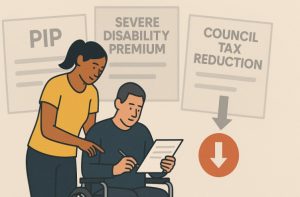
While PIP is not affected by Carer’s Allowance, other benefits the PIP recipient receives can be. In particular, any additional benefits based on the assumption that no one is claiming Carer’s Allowance for the individual can be removed.
Two common benefits affected are:
- Severe Disability Premium (SDP)
- Extra amount for severe disability under Pension Credit
When someone starts receiving Carer’s Allowance for caring for a PIP recipient, the recipient may:
- Lose the Severe Disability Premium
- See a reduction in their Pension Credit
- No longer qualify for some Council Tax discounts
These changes occur because one of the eligibility criteria for these additional benefits is that no one must be receiving Carer’s Allowance for looking after the claimant.
To determine whether a change will apply, it’s best to contact:
- Jobcentre Plus
- The Pension Service Helpline
- The relevant local council
- Universal Credit service centre
They can confirm if a premium or reduction will be removed.
Can You Claim Carer’s Allowance While Receiving State Pension?
Carer’s Allowance and the State Pension are both classed as overlapping benefits. If the claimant receives State Pension at a rate higher than Carer’s Allowance, they cannot be paid Carer’s Allowance in addition.
However, there are still advantages to claiming Carer’s Allowance:
- You may get an underlying entitlement, which can unlock Carer Premiums in other benefits
- You may qualify for additional help through Pension Credit
If the person delays their State Pension to build up additional entitlement, they cannot continue accruing that extra entitlement once they start claiming Carer’s Allowance.
What Other Financial Support Can Carers Access Alongside Carer’s Allowance?
Carers may be eligible for various types of financial support in addition to Carer’s Allowance. These include:
- Carer Premium: Added to means-tested benefits such as Income Support and Housing Benefit
- Carer Element: Part of Universal Credit for recognised carers
- Carer’s Credit: National Insurance credit to protect your State Pension record
- Council Tax Reductions: Some councils offer discounts or exemptions
- Local welfare schemes: May include grants or emergency support
Each of these benefits or schemes has its own eligibility criteria, so it’s advisable to contact local authorities or check official calculators online.
How Do You Report Changes When Receiving Carer’s Allowance?
Any change in circumstances should be reported immediately to prevent overpayments or interruptions in benefit payments.
Changes that need to be reported include:
- Stopping or reducing the number of hours of care provided
- Starting full-time education or a new job
- Changes in income or employment status
- Temporary absences from the UK or hospital stays
- If the person you care for moves or passes away
To report a change, contact the Carer’s Allowance Unit or update your details via GOV.UK. For those also on Universal Credit, the online Universal Credit journal should be updated.
Delays in reporting can result in overpayments, which may lead to repayment demands or penalties.
Conclusion
Carer’s Allowance can be an essential support for people providing unpaid care, but it can also affect other benefits — both for the carer and the person being cared for. Understanding how it interacts with PIP, Universal Credit, and other support schemes is key to making informed decisions.
Claimants should regularly check eligibility, use tools like the GOV.UK benefits calculator, and seek advice from professional advisors or charities to maximise support without facing unexpected reductions.
Frequently Asked Questions
Can you get Carer’s Allowance and PIP for the same person?
Yes. One person can receive PIP, while another can receive Carer’s Allowance for looking after them. However, the same person cannot claim both for themselves.
Does Carer’s Allowance reduce the amount of Housing Benefit you get?
It can. Carer’s Allowance is considered income, which could reduce Housing Benefit. However, a carer premium may offset the reduction.
What is the earnings limit for Carer’s Allowance in 2025?
You must earn £151 or less per week (after deductions) to qualify.
Will claiming Carer’s Allowance affect the person I care for?
It won’t reduce their PIP but could stop additional benefits like the Severe Disability Premium or Council Tax reductions.
Is Carer’s Allowance classed as income for tax credits?
Yes. You must inform HMRC about your Carer’s Allowance claim as it can affect Working or Child Tax Credits.
How does Carer’s Allowance impact Council Tax Reduction?
The person being cared for might lose Council Tax Reduction if their Severe Disability Reduction ends due to your claim.
Can you backdate a Carer’s Allowance claim?
Yes, Carer’s Allowance claims can be backdated for up to 3 months, if eligibility conditions were met during that period.

